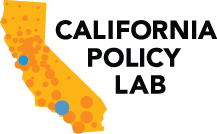- By:
- Category:

Sacramento, December 14th, 2020 — A new analysis of the bipartisan Emergency COVID Relief Act of 2020 finds that it would help 1 million Californians who will otherwise be abruptly cut off from unemployment benefits on December 26th, 2020.
The analysis from the nonpartisan California Policy Lab finds that the bill’s extension of Pandemic Unemployment Assistance (PUA) would help 859,422 Californians who would otherwise be cut off on December 26th, and it would also help another 208,024 individuals who are currently receiving regular UI benefits but who would also be cut off on December 26th. More than 320,000 Los Angeles residents will lose benefits if Congress does not act, according to the new analysis.
“This proposal to extend PUA and PEUC for an additional 16 weeks would push the looming December 26th “exhaustion cliffs” to April and June, creating more time for the COVID-19 surges to subside, for business restrictions to lessen, and for people to find jobs before they’ve used up their unemployment benefits,” explains Till von Wachter, a co-author of the analysis, UCLA economics professor and faculty director at the California Policy Lab at UCLA. “This proposal isn’t perfect, but it’s better than cutting off millions of workers from their only source of income amid a surge in COVID-19 cases and business restrictions. Extending the PUA and PEUC programs would help people to buy groceries and pay their rent while also buying time for the labor market to recover. The urgency of passing a relief bill quickly cannot be understated. Even if Congress were to pass this bill tomorrow, due to the time it takes for states to implement these policy changes in their UI systems, many workers may still go weeks without their unemployment checks.”
The analysis finds that extending the two federal programs would provide nearly $10 billion of unemployment benefits to Californians over the next four months, enough to indirectly preserve or generate almost 45,000 jobs. The proposal also calls for reinstating a federal supplement to UI benefits of $300 a week, which the new analysis finds would generate an additional $30 billion in economic activity in California between now and April.
Key research findings
- Hispanic workers, Black workers, and younger workers will be disproportionately impacted if PUA and PEUC are not extended, while workers in the low-wage service sectors would be the most affected by the end of PEUC.
- In California, extending the PUA and PEUC programs through April and extending benefit duration maximums by just 16 weeks would help 95% of the people who would otherwise lose benefits in the coming months.
- California has the largest number of PUA claimants in the country, making the state’s economy especially vulnerable to the impacts of the program expiring.
###
The California Policy Lab creates data-driven insights for the public good. Our mission is to partner with California’s state and local governments to generate scientific evidence that solves California’s most urgent problems, including homelessness, poverty, crime, and education inequality. We facilitate close working partnerships between policymakers and researchers at the University of California to help evaluate and improve public programs through empirical research and technical assistance.
